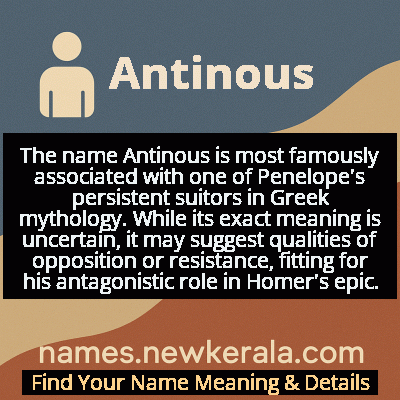Antinous Name Meaning & Details
Origin, Popularity, Numerology Analysis & Name Meaning of Antinous
Discover the origin, meaning, and cultural significance of the name ANTINOUS. Delve into its historical roots and explore the lasting impact it has had on communities and traditions.
Name
Antinous
Gender
Male
Origin
Greek
Lucky Number
5
Meaning of the Name - Antinous
The name Antinous is most famously associated with one of Penelope's persistent suitors in Greek mythology. While its exact meaning is uncertain, it may suggest qualities of opposition or resistance, fitting for his antagonistic role in Homer's epic.
Antinous - Complete Numerology Analysis
Your Numerology Number
Based on Pythagorean Numerology System
Ruling Planet
Mercury
Positive Nature
Adventurous, dynamic, curious, and social.
Negative Traits
Restless, impatient, inconsistent, prone to indulgence.
Lucky Colours
Green, white.
Lucky Days
Wednesday.
Lucky Stones
Emerald.
Harmony Numbers
1, 3, 9.
Best Suited Professions
Sales, marketing, travel, entertainment.
What People Like About You
Versatility, charisma, adventurous spirit.
Famous People Named Antinous
Antinous of Ithaca
Mythological Suitor
Primary antagonist among Penelope's suitors in Homer's Odyssey
Antinous of Claudiopolis
Imperial Companion
Beloved of Emperor Hadrian, deified after his death and worshipped throughout Roman Empire
Antinous Mondragone
Artistic Subject
Iconic sculptural representation of male beauty from Roman antiquity
Name Variations & International Equivalents
Click on blue names to explore their detailed meanings. Gray names with will be available soon.
Cultural & Historical Significance
Centuries later, the name gained entirely new significance through Antinous of Bithynia, the beautiful youth who became Emperor Hadrian's beloved companion. His mysterious death by drowning in the Nile River in 130 AD transformed him into a cultural icon. Hadrian's profound grief led to Antinous's deification and the establishment of a widespread imperial cult, with temples, statues, and coins bearing his image proliferating throughout the Roman Empire. This second incarnation made Antinous one of the last classical figures to achieve divine status, representing the ideal of male beauty, tragic romance, and the power of imperial favor to immortalize a mortal life.
Extended Personality Analysis
The personality associated with the name Antinous is complex and dual-natured, reflecting his two most famous incarnations. From the Homeric character emerges a profile of ambition, arrogance, and relentless pursuit—traits of someone who knows what they want and pursues it without hesitation, even when it means disregarding social conventions or the rights of others. This Antinous represents the dangerous charmer, capable of leadership among his peers but ultimately self-serving and manipulative. There's an intensity to this personality that borders on obsession, with a confidence that can tip into hubris.
Conversely, the historical Antinous of Hadrian's court suggests qualities of beauty, devotion, and tragic romanticism. This aspect of the name implies deep loyalty, emotional intensity, and a capacity for profound connection. The personality here is more reflective and sensitive, capable of inspiring great love and artistic idealization. The combination of these two historical figures creates a rich psychological profile: someone potentially magnetic and determined, with a powerful presence that can manifest as either destructive ambition or deep devotion. The name suggests a person of strong passions who leaves a lasting impression on those they encounter.
Modern Usage & Popularity
In contemporary naming practices, Antinous remains an exceptionally rare choice, primarily confined to classical scholars, history enthusiasts, and families with strong connections to Greek culture. The name has never achieved mainstream popularity in any Western country and doesn't appear in official baby name statistics. Its usage is most common in Greece and Italy, where classical names maintain cultural continuity, though even there it's considered unusual. The name experiences occasional revivals in artistic, literary, and academic circles, particularly among those fascinated by Greco-Roman history or LGBTQ+ historical narratives, given Antinous's relationship with Emperor Hadrian. Its extreme rarity makes it a distinctive choice for parents seeking a name with profound classical roots and complex cultural associations.
Symbolic & Spiritual Meanings
Symbolically, Antinous represents a powerful duality that encompasses both destructive ambition and immortalized beauty. He embodies the tragic romantic ideal—the beautiful youth whose premature death transforms him into an eternal symbol of love and loss. As the arrogant suitor from Homer's Odyssey, he symbolizes hubris, unwanted pursuit, and the consequences of violating social and moral boundaries. As Hadrian's deified beloved, he represents the power of grief to create lasting cultural monuments and the human desire to eternalize beauty through art and worship. The name carries profound connotations of classical perfection, the fleeting nature of youth and life, and the transformative power of memory and love. It serves as a reminder that human lives, however brief, can achieve immortality through the stories we leave behind and the emotions we inspire in others.

